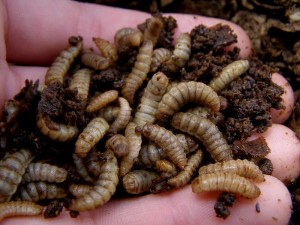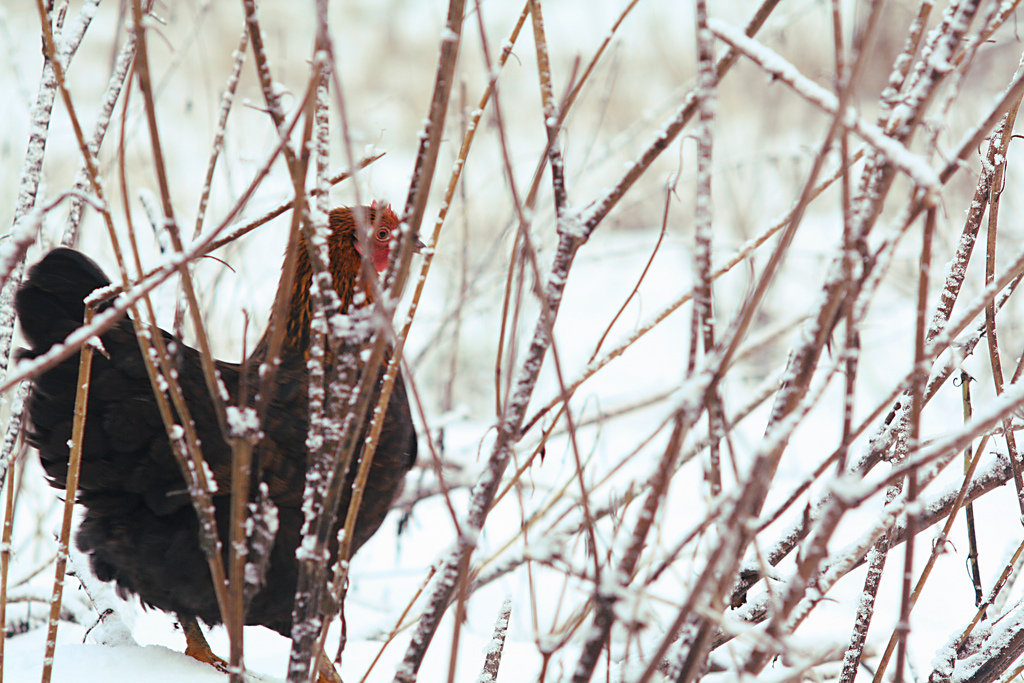 Like most people, I love to receive mail (so long as it is not a bill or junk). Recently, I have gotten several messages from Urban Chicken Podcast listeners, who wrote to either pose a burning chicken question they have or to share a useful chicken tip. Today on the UCP, I am sharing three of these listener letters with the audience and answering questions such as “how cold is too cold for your chickens?” and “what do I think about feeding chickens sprouted grains and soldier flies?” and much more. I also talk about an email that provides me and the UCP listeners a great tip on a resource for quality poultry education classes and teachers.
Like most people, I love to receive mail (so long as it is not a bill or junk). Recently, I have gotten several messages from Urban Chicken Podcast listeners, who wrote to either pose a burning chicken question they have or to share a useful chicken tip. Today on the UCP, I am sharing three of these listener letters with the audience and answering questions such as “how cold is too cold for your chickens?” and “what do I think about feeding chickens sprouted grains and soldier flies?” and much more. I also talk about an email that provides me and the UCP listeners a great tip on a resource for quality poultry education classes and teachers.
How Cold is Too Cold
The first listener letter comes from a gentleman who lives in Pennsylvania – a state currently suffering under extreme cold winter conditions – often referred to as a “polar vortex.” Yikes! That sounds miserable! Here is what he wrote to me:
Hello:
First let me say how much I enjoy the podcast. I tune in as often as I can, but that has been sporadic the last few months so my apology if this has been covered in a previous show.
Here in Western PA it went below zero this week for a few days. A friend and I both plan on getting some laying hens this year, probably march-ish so they are ready to be laying in spring. But we both wondered just how they would handle that extreme cold? How cold can a cold-breed take?
And the other concern is water. I have seen a few homemade solutions online about keeping the water of coop to just around freezing. But what should us northerners do here? Bringing them inside is not a real option.
Thanks!
SRD
First I want to say thank to SRD from snowy Pennsylvania for listening to the show and taking the time to send me his questions. I really appreciate it!
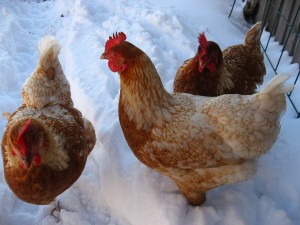 So let’s consider his questions. There are a few things that SRD needs to consider as he selects his spring chicks and prepares to care for them starting in March. First, SRD and anyone buying spring chicks for a flock in a location that has cold winter issues needs to be really mindful of picking appropriate, cold-hardy breeds. SRD sounds like he is already researched and educated himself on which chicken breeds do better in cold climates, but if that is something you still need to learn about you can listen to archive UCP episode 003, in which I discuss at length which breeds are well-suited for cold weather and which breeds simply cannot take winter and would need a lot of accommodations.
So let’s consider his questions. There are a few things that SRD needs to consider as he selects his spring chicks and prepares to care for them starting in March. First, SRD and anyone buying spring chicks for a flock in a location that has cold winter issues needs to be really mindful of picking appropriate, cold-hardy breeds. SRD sounds like he is already researched and educated himself on which chicken breeds do better in cold climates, but if that is something you still need to learn about you can listen to archive UCP episode 003, in which I discuss at length which breeds are well-suited for cold weather and which breeds simply cannot take winter and would need a lot of accommodations.
Secondly, even if SRD buys extremely cold hardy breed chicks – they are still chicks. Now, I have never been to Pennsylvania in March, but I’d bet dollars to donuts – it’s not too warm there during that month. Chicks are very sensitive to cold and will easily die on you if you do not keep them warm enough. SRD is going to have to keep his flock inside and under a heat lamp at least for the first five to six weeks. Chicks, once they are that age, can be moved outside if the outdoor temperatures are about 65° Fahrenheit. So even if SRD’s chicks are 5-6 weeks old, if it is still too cool outdoors, they will need to continue living inside. This is one of the factors to consider when trying to time when to get your new spring chicks.
The major concern SRD has is, “how cold is too cold for chickens?” Chickens are not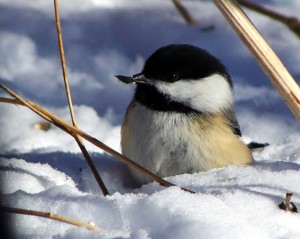 mammals and have different tolerances for weather conditions. They physically function differently (e.g. they are covered in their own down jacket). As we get attached to our flocks, it is nature for us to feel sympathetic for our birds and begin to anthropomorphize them – worrying that our chickens feel the same way we do about the weather. Chicken can and do tolerate very cold temperatures well, in ways that humans could not. Several chicken experts claim that chickens do not ever need a heat lamp in the coop. To support this point of view, these experts often analogize chickens to wild birds. They note that even in very cold weather, there are wild birds out and about living perfectly well without the aid of a heat lamp. The wild bird analogy has some truth to it in that it illuminates how differently humans and birds physically function in the cold and that our projected feelings on our flock are misplaced. However, the analogy rings hollow in other ways. Chickens are not the same as wild chickadees. Wild birds don’t have long waddles and large combs. Wild chickadees haven’t been especially breed over decade (if not centuries) to have fancy feathers or naked necks or any other number of special attributes. Lastly, wild birds are not trapped inside of a coop all day that may be drafty or humid. Chickens have different care needs than a wild bird and are wholly dependent upon their human owners to provide appropriate shelter and care for their needs during winter.
mammals and have different tolerances for weather conditions. They physically function differently (e.g. they are covered in their own down jacket). As we get attached to our flocks, it is nature for us to feel sympathetic for our birds and begin to anthropomorphize them – worrying that our chickens feel the same way we do about the weather. Chicken can and do tolerate very cold temperatures well, in ways that humans could not. Several chicken experts claim that chickens do not ever need a heat lamp in the coop. To support this point of view, these experts often analogize chickens to wild birds. They note that even in very cold weather, there are wild birds out and about living perfectly well without the aid of a heat lamp. The wild bird analogy has some truth to it in that it illuminates how differently humans and birds physically function in the cold and that our projected feelings on our flock are misplaced. However, the analogy rings hollow in other ways. Chickens are not the same as wild chickadees. Wild birds don’t have long waddles and large combs. Wild chickadees haven’t been especially breed over decade (if not centuries) to have fancy feathers or naked necks or any other number of special attributes. Lastly, wild birds are not trapped inside of a coop all day that may be drafty or humid. Chickens have different care needs than a wild bird and are wholly dependent upon their human owners to provide appropriate shelter and care for their needs during winter.
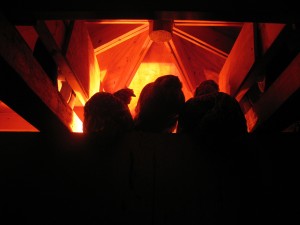 To answer the question, I think that you probably could put cold hardy chickens out in a well-built coop without any heat all winter, regardless of the temperatures, and they would generally survive. However, I do not necessarily believe that such unaided chickens would make it through winter unscathed. At some point frostbite becomes a real concern. There is no magic number that I can give SRD that 100% for sure chickens are fine in the cold unaided to this temperature.
To answer the question, I think that you probably could put cold hardy chickens out in a well-built coop without any heat all winter, regardless of the temperatures, and they would generally survive. However, I do not necessarily believe that such unaided chickens would make it through winter unscathed. At some point frostbite becomes a real concern. There is no magic number that I can give SRD that 100% for sure chickens are fine in the cold unaided to this temperature.
If I were to make an educated guess, based on my research and experience, I would estimate that a good rule of thumb is that chickens should be fine unheated to about 20° Fahrenheit. Below 20°, the chicken owner might want to consider a heat source in the coop to ensure there are no frostbite issues with the flock. Be sure that any heat source placed in a coop is well-situated and sized. You do not want to have it knocked over and burn down the coop. You also do not want it to be too powerful so that the birds become too hot and humid. You can learn much more about frostbite risks for your flock in archive UCP episode 003 as well.
SRD’s second question was how should he deal with freezing chicken waterers in winter? I have a single answer for this issue – heated base. A heated base is frankly the simplest and most effective solution to this issue. Many heated bases for waterers have an internal thermometer which self-activates whenever the weather dips below 32° – freezing. Remember, that if you use a heated base you need to use a metal watering pan or waterer. The heated bases will melt a plastic watering dish. (BTW – this is the heated base I am using: Little Giant 125 Watt Water Heater Base HB125)
Sprouted Grains and Soldier Flies
The next email comes from a young Urban Chicken Podcast listener who poses a very interesting question about alternative foods for your flock. Here is what she wrote:
Hey Jen!
My name is Julia, I’m thirteen, and I am the resident chicken lady in my family! Last summer I emailed you about summer proofing your flock, I loved the podcast episode you made on the subject I found it very informative!
When our family gets chickens in the spring I don’t want to feed them any grain if possible, so I was looking at other feed alternatives and came across two that looked good! They were, sprouted barley, and black soldier fly larva. Have you ever looked into these options and if so what are your thoughts on the matter?
I love your podcast and listen to it every week!
Love Julia
First, I want to thank Julia – I think it is absolutely fantastic that she is listening to the Urban Chicken Podcast every week!
The first question posed by Julia, “what do I think about sprouted grains as feed?” goes to 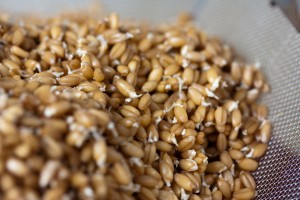 the issue of food nutrition and digestion. Let me explain a little background on this issue. Grains, like other plants, are designed to have some self-protecting mechanisms built in their genetics. The protective mechanism in grain is that, when consumed, certain attributes make it difficult to digest with the goal of passing through the animal and being able to still germinate out on the other side. Consequently, grains have gluten, phytic acids, enzyme inhibitors and lectins, which make the grain difficult to digest and somewhat harmful to the consumer. For example, phytic acids have been linked to bone and tooth decay.
the issue of food nutrition and digestion. Let me explain a little background on this issue. Grains, like other plants, are designed to have some self-protecting mechanisms built in their genetics. The protective mechanism in grain is that, when consumed, certain attributes make it difficult to digest with the goal of passing through the animal and being able to still germinate out on the other side. Consequently, grains have gluten, phytic acids, enzyme inhibitors and lectins, which make the grain difficult to digest and somewhat harmful to the consumer. For example, phytic acids have been linked to bone and tooth decay.
In an effort to make grains more digestible and the nutrients more bioavailable, humans traditionally have either sprouted or fermented the grains before consumption. It is believed that either sprouting or fermenting the grains helps to lessen or remove the harmful protective attributes of the grain and make it a digestible, nutrient-rich food. However, the nutrition world is absolutely divided on whether sprouting and/or fermenting actually makes a meaningful difference.
I am not an expert on nutrition and so I can only provide an educated guess on this matter, which is that I would suppose that sprouting (or fermenting) grains would help make them more easily digestible and nutritious – because the hard hull around the grain is changed and partially “pre-digested” (for lack of a better way to describe it). I have no opinion as to the quantification of how much sprouting (or fermenting) improves the digestibility of the grain. Julia mentioned sprouting barley. From my research, wheat is the most toxic of the grains. Other grains, such as barley, are believed to be much easier to render healthful through the sprouting (or fermenting) process.
That being said, there are some issues that one needs to be mindful of when relying solely on sprouted (or fermented) grains as feed. Chickens need certain nutrients, minerals and protein not found in sprouted or fermented grains to be healthy. These necessary supplements are added into commercially produced chicken feeds. If you are going to use sprouted (or fermented) grains with your flock, you must fortify that feed with minerals, protein and other nutrients. Below are two videos of chicken keepers that demonstrate how to properly sprout and supplement such feed with necessary, natural additives.
The second question Julia posed was “what is my opinion on using Soldier Fly larvae as a protein source for one’s flock?” I have never personally used this protein source however there are tons of research resources that tout the ease and benefits of raising Soldier Flies both for vermicomposting and poultry feed purposes. From a nutritional standpoint, I cannot see any reason not to raise and feed Soldier Fly larvae to your flock. From a practical standpoint, I think there are some difficulties with relying solely on Soldier Fly larvae for your flock’s protein source.
I have personally tried vermicomposting at my house in Boise, Idaho (using red worms – not Soldier Fly larvae) and I had great difficulty with it. Boise gets really hot and dry in the summer and quite cold in the winters. In summertime, I struggled with temperatures that were too hot and conditions that were too dry for the worms – they were drying out and dying on me quickly and easily. Additionally, I live in an old house with a detached garage that does not have electricity in it. When the nights became quite cool in Fall, I did not have a good place to keep my vermicomposting bin the required 70° Fahrenheit in order to keep the worms alive. Similarly, Soldier Flies need to be kept 85-100° Fahrenheit. This can be a difficult proposition for people like me who live in snow country and do not have an appropriate indoor location to keep a vermicomposting bin.
Similarly, winter weather is going to present challenges for growing sprouted grains for your flock. Grains typically need to be kept at a constant 70-80° Fahrenheit in order to successfully sprout. Come wintertime, one would have to soak and sprout grains indoors. My personal home in wintertime is never 70° Fahrenheit inside – it’s an old house that just leaks heat. I cannot even successfully rise bread dough in my kitchen all winter because it’s too cold – so sprouting buckets of grains is definitely out of the question. I imagine other cold climate dwellers would have the same challenges I face.
I think that relying on sprouted grains and Soldier Fly larvae for a flock’s feed year round might be a messier and more difficult proposition than what the average person would want to take on. Despite these challenges, with proper planning and effort one could sprout grains and raise Soldier Fly larvae for feed even during winter.
Julia, good luck with your alternative chicken feed plans. Please send photos and information as to how it works out for you. I am very curious and would love to share that with the Urban Chicken Podcast audience.
Chicken Educational Classes Tip
The last email offers a chicken tip, rather than asking a question. Here is what the UCP listener wrote:
I’ve been listening to your podcast from the beginning. I just have a small backyard flock as of now, but planning on becoming a heritage breed breeder this year. I have signed up for a week long poultry school through the Sustainable Poultry Network. I have attended a seminar by the founder Jim Adkins and also watched 2 full seminars on YouTube by him. Very good teacher, very kind to us beginners as well. One of the YouTube seminar’s had a talk by Harvey Ussery, was excited about that since his book seems the best fit for the style of poultry keeping I want to emulate.
Anyway, just thought you might post it on your calendar and I wanted to say thank you for such a fun and professional podcast. I get very excited when you bless us with a new one!
Karen
Apex, NC
Karen, thank you for sharing this information about Jim Adkins, Harvey Ussery and the Sustainable Poultry Network. This is a terrific chicken education tip!
I have been following the Sustainable Poultry Network and it does seem like the organization offers quality education about keeping poultry. I went on You Tube and watched several videos of Jim Adkins and Harvey Ussery – brilliant stuff! Both gentlemen have a wealth of chicken knowledge to share.
Jim Adkins Speech on Heritage Poultry Farming
The week long poultry school mentioned by Karen in her email was added to the Chicken Calendar of Events found on the Urban Chicken Podcast website. Be sure to check out the calendar for chicken events happening in your area. Additionally, there are several links to videos of Jim Adkins and Harvey Ussery below.
Harvey Ussery Interview on Natural Poultry Feeds (i.e. plants and herbs)
Also, thank you Karen for also listening to the Urban Chicken Podcast! It means a lot to me that you enjoy the show.
CHICKEN NEWS:
- Montgomery Advertiser – Chicken Coop for Downtown Farm ARTICLE
- Times Daily – Chickens are Coming to Montgomery Urban Center ARTICLE
MAIN SEGMENT:
- BYC Forum – Discussion on how cold is too cold for chickens THREAD
- Mother Earth News – Ask the Expert Answers How Cold is too Cold POST
- Michael C Michael Do – Black Soldier Fly Composting 101 ARTICLE
- Garden Pool – Soldier Fly Larvae Chicken Feeder (with Plans) ARTICLE
- Avian Aqua Miser – Soldier Fly Larvae as Chicken Feed ARTICLE
- Canada NOW – News Report on Using Sprouted Barley as Feed VIDEO
- Permies – Forum Discussion on Sprouted/Fermented Feeds THREAD
- BYC Forum – Discussion on Fermenting Feeds for Chickens THREAD
- You Tube – Harvey Ussery Talking about Nesting Boxes VIDEO
- You Tube – Harvey Ussery Discussing Broody Hens VIDEO
- Harvey Ussery’s book: The Small-Scale Poultry Flock: An All-Natural Approach to Raising Chickens and Other Fowl for Home and Market Growers
SALLY’S SIDENOTES:
- Today – Chocolate-Flavored Fried Chicken Coming to Los Angeles ARTICLE
- LA Weekly – Choco Chicken Restaurant Opening in March ARTICLE
- Huffington Post – Choco Chicken Either Brilliant or Stupid Idea ARTICLE
- Eater – Choco Chicken Restaurant in Downtown LA ARTICLE
Podcast: Play in new window | Download | Embed
Subscribe: Apple Podcasts | RSS


